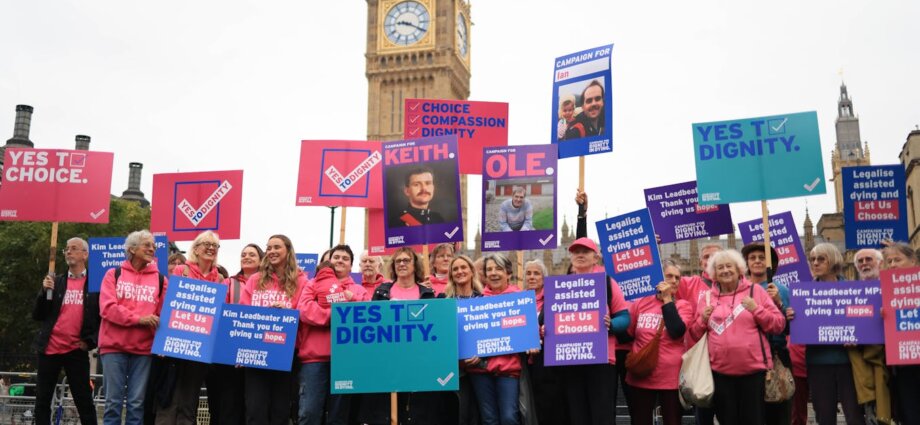People in England and Wales are not allowed assistance to die, even when they are terminally ill and wish to end their lives. Those wishing to access assisted death sometimes choose to travel to countries where it is legal, but this can lead to legal problems if others help them to travel.
Although suicide is not illegal, helping someone to die is a crime punishable by up to 14 years in prison. However, guidelines from the director of public prosecutions state that when someone helps a person to die out of compassion, prosecution is less likely if the person requested it and the helper will not benefit from that person’s death.
High-profile cases in the UK, such as those of Diane Pretty, Debbie Purdy and Tony Nicklinson, have revealed how not allowing free choice regarding assisted dying might lead to violations of people’s human rights.
A recently published bill, the terminally ill adults (end of life) bill, aims to permit people in England and Wales who have an incurable illness to be legally assisted by a doctor to die. However, this proposal has sparked concerns that patients might be pushed to end their lives. MP Kim Leadbeater who proposed the bill, has stated that it contains strong safeguards, but what are they and will they work in practice?
Under the bill, the patient would need to be over 18, living in England or Wales for at least a year, registered with a GP, and with mental capacity (so able to understand the decision they are making, weigh its pros and cons and communicate it). They must also be likely to die within six months, have a clear, settled and informed wish to end their life, and not have been pressured into making the decision.
The patient would need to communicate their intentions to a doctor. The doctor would discuss the patient’s life prospects, any available cure or palliative treatment that might allow them to continue to live more comfortably, and the details of the dying process.
After this, the patient would sign a written request for assisted dying to be approved by the doctor. This would need to be witnessed by another person. After seven days, a separate doctor would need to confirm the authorisation.
If the second doctor disagrees with the first, the bill allows another doctor to authorise the decision. Finally, the patient would need to request an authorisation from the High Court. Once this is granted, the person would still have to wait 14 days before they could sign a second assisted dying request and be helped to die.
This process means that those who are unconscious or have dementia or long-term conditions would not be able to access assisted dying.
The bill also says that a person must be able to either swallow medication or start the drip for the medications themselves. Besides being hard to monitor within hospital walls, this rule may mean that people who are paralysed are excluded, too. It may also limit the use of sedation, which could make the process more distressing for patients.
Difficult to apply in practice
These safeguards might be difficult to apply in practice, creating the possibility for abuse or mistakes. Working out how long a person will live can be difficult and depends on several factors. It can also be difficult to make sure that a person truly has mental capacity, especially if they are frightened or depressed because of their illness.
Pressures on health services may also affect a doctor’s time and willingness to discuss the realities and complexities of assisted dying with patients.
The bill does not require the help of a psychologist, patient-support organisations or other professionals who might help with such conversations. The bill also states that the discussion should focus on the requirements for assisted dying, rather than on whether that choice is good for the patient.
The waiting time between the various steps might also not be long enough to have a serene reflection on the decision.
Finally, as researchers have found in several countries, patients might request assisted dying due to social pressures, such as lack of social and palliative care, loneliness and fear of being a burden to others. There are also fears from people with disabilities that if the idea that a life with illness is so terrible takes hold, safeguards will be eroded and they might find themselves having to justify why they want to keep living, rather than having that recognised as a right. The current bill does not address these issues.
To protect choice and dignity, it is important that law reform not only focuses on the “how” of assisted dying but also the “why”. Otherwise, it risks harming patients while not solving the problems it seeks to address.
The second reading of the bill is on November 29 2024.
The authors do not work for, consult, own shares in or receive funding from any company or organisation that would benefit from this article, and have disclosed no relevant affiliations beyond their academic appointment.











